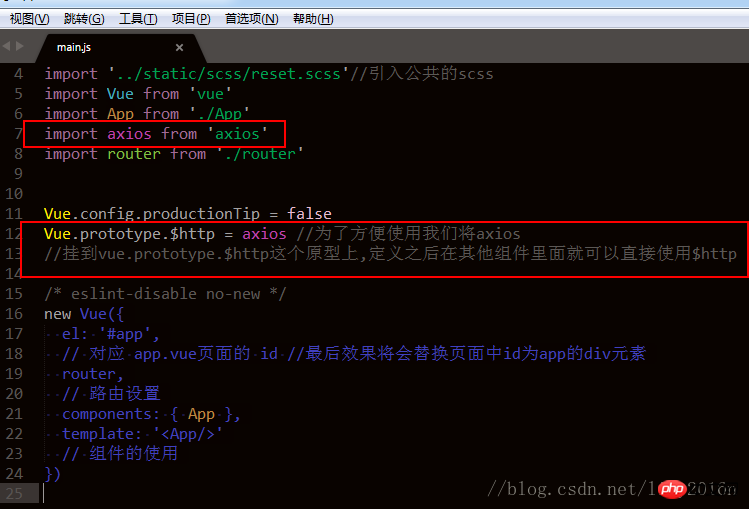
This time I will show you how vue axios operates data interaction, and what are the precautions for vue axios operating data interaction. The following is a practical case, let's take a look.
The network communication library officially recommended by Vue is no longer vue-resource. It is recommended to use axios. So I studied it and summarized it as follows.
1. Functional features
1. Send XMLHttpRequests requests in the browser
2. Send http requests in node.js
3. Support Promise API
4. Intercept requests and responses
5. Convert request and response data
6. Automatically convert JSON data
7. Client supports protecting security from XSRF attacks
2. Axios installation method (officially gives 3 methods)
1. npm installation
$ npm install axios
2. Bower installation
$ bower install axios
3. Use cdn directly
<script src="https://unpkg.com/axios/dist/axios.min.js"></script>
3. Installation steps
Here I use npm method steps:
①First enter npm install axios in npm
②Add configuration to main.js
import axios from ‘axios' Vue.prototype.$http = axios

##4. Request Example
Click to get the data to get the data you want<template>
<p class="tabbar">
<p>首页</p>
<button v-on:click = 'goback'>获取数据</button>
<p class="new_wrap" v-for="items in item">
<p class="newcard">
<p>
<p>{{items.issuer_nickname}}.</p>
</p>
<p>
{{items.title}}
</p>
<p class="pic">
<img :src="items.cover">
</p>
</p>
<br>
</p>
</p>
</template>
<script>
export default {
name: 'tabbar',
data () {
return {
msg: 'Welcome to Your Vue.js App',
item: []
}
},
methods:{
goback:function(){
console.log('hah');
this.$http.get('url') //把url地址换成你的接口地址即可
.then(res => {
//this.request.response = res.data
this.item = res.data.data.item; //把取item的数据赋给 item: []中
console.log(res.data.data.item);
if (res.data.code == '0') {
console.log('haha');
}else{
alert('数据不存在');
}
})
.catch(err => {
alert('请求失败');
})
}
}
}
</script>
<!-- Add "scoped" attribute to limit CSS to this component only -->
<style scoped lang="scss">
*{margin: 0;padding: 0;}
@function torem($px){//$px为需要转换的字号
@return $px / 100px * 1rem; //100px为根字体大小
}
ul{
width: 100%;
position: absolute;
bottom: 0;
li{
width: torem(187.5px);
float:left;
height: torem(98px);
text-align:center;
background: #ccc;
}
}
img{
width: torem(200px);
height: torem(200px);
}
</style>
Use JS original values and reference values to store
JS array flattening, anti-shake and throttling Object copy
The above is the detailed content of How vue+axios operates data interaction. For more information, please follow other related articles on the PHP Chinese website!




